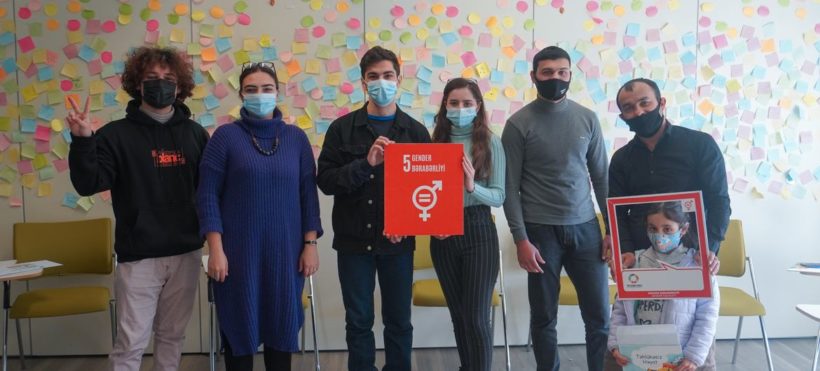Azerbaijani activist Maryam Majidova fights to improve gender equality in her country and address the daily challenges faced by women and girls.
Maryam Majidova is co-founder of the social platform Gender Hub, which brings together advocacy groups, non-profit organisations, feminists and human rights activists to combat gender-based violence in her country. This forum aims to empower women and girls and support them in overcoming gender-related difficulties.
“I have had to fight against gender stereotypes and discrimination since my childhood when I lost my father. At school and university, when I was successful, people would ask me about ‘the man’ behind it. They could not accept that a woman could succeed without the help of a man.
I believe that gender stereotypes have harmful effects on women’s ability to develop their personal skills, their careers and to make decisions about their lives. I decided to dedicate myself to eradicating these stereotypes which, unfortunately, are prevalent throughout Azerbaijan”.
Young Azerbaijani women activists take to the streets to demand gender equality on International Women’s Day 2021.
With the participation of men and boys
“As a gender activist, trainer and youth policy expert, I worked on positive youth development for about ten years. I collaborated with international organisations – including the United Nations – on projects supporting women’s participation in public and political life.
According to the National Survey on Violence against Women in Azerbaijan, 24 per cent of women aged 15-59 are victims of violence by someone other than their partner or their own partner. This is a national problem, which should be a priority for the government.
The active involvement of men and boys is the key to preventing and tackling violence against women. If they are involved, society’s perception of gender roles and patriarchal norms can be changed.
To raise awareness about the consequences of violence against women and the benefits of a gender-equitable society, my colleagues and I organised a series of events across the country, using the hashtag #menengage, a key theme of the 2021 campaign “16 Days of Activism against Gender Violence”, launched by the UN in Azerbaijan.
Football wears orange
The United Nations partnered with an Azerbaijani football team, Neftchi FC, which agreed to play one of its league matches in orange jerseys with the slogan “End Violence against Women”. The UN also collaborated with local influencers who helped spread the slogan through the media and social media.
It is difficult to bring about rapid change when dealing with such a deep-rooted cultural and structural problem. However, I am confident that these kinds of projects send the right message and help drive the kind of change we dream of.
Companies often hire women just because of quotas, for token inclusion, but I don’t want to be hired just to meet the numbers. I also believe that no one should tell a woman what she deserves, or how she should behave. I simply want women to have the same rights as men.
The struggle for gender equality in Azerbaijan
Women’s representation at decision-making levels is low in Azerbaijan: the country ranks 88th out of 194 countries in the 2020 United Nations Development Programme (UNDP) Gender Development Index.
In the National Parliament, 18.3 per cent (22 out of 120) of the members are women. Men also dominate the upper echelons of the executive branch. Women are minimally represented in the judiciary: only 57 of 480 judges, 47 of 1069 prosecutors and 6 of 41 Supreme Court judges are women.
Gender stereotypes are also used to justify violence against women, which remains a major problem in Azerbaijan. According to the country’s Prosecutor General’s Office, 51 women were killed and 24 were injured as a result of domestic violence between January and September 2021.










